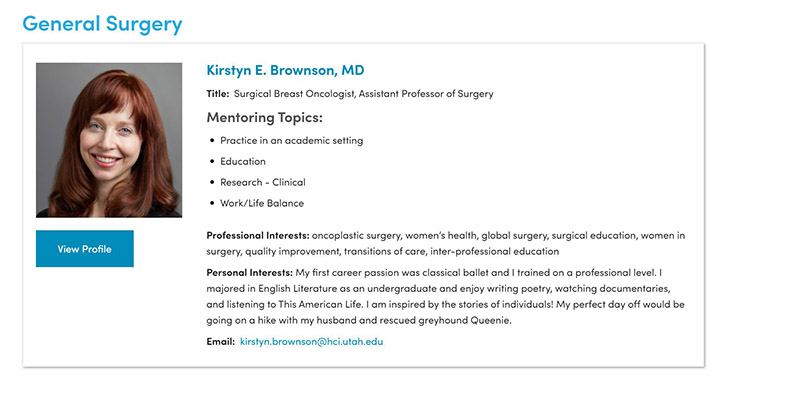One of the newest programs in the Department of Surgery through the Office of Surgical Education (OSE) is our mentor match program, which is known as Mentor Connection.
Dr. Kirstyn Brownson, a Breast Oncologist and one of our newest assistant professors in the Division of General Surgery, is spearheading this program; we reached out to her to find out her inspiration and goals moving forward with this exciting program!
Q: What made you decide to initiate the Department of Surgery Mentor Connection program?
Dr. Brownson: Most of us (surgeons) are where we are today because we were fortunate to have crossed paths with an amazing mentor(s). That is probably the biggest reason why I am so passionate about mentorship. As the Faculty Lead for the SEAD program (Surgical Exploration And Discovery ─ a two-week course during which MS1 students are exposed to surgery and surgical subspecialties), I heard from many disappointed medical students when we had to cancel the program this year due to COVID-19.
It was clear from communicating with the medical students that many were eager to engage with surgeons and explore surgery further as a future career. Facilitating surgical mentorship seemed like a good way to start to engage students in surgical career exploration.

Above is Dr. Kirstyn Brownson's mentor listing for Mentor Connection on the Office of Surgical Education website. To apply to be a mentor, please complete this form.
Q: Is your program modeled after any other Mentor Connection program?
Dr. Brownson: Yes. Mentor Connection was modeled after the Society for Vascular Surgery’s (SVS) “Mentor Match” program. While brainstorming with Dr. Brigitte Smith about opportunities to reach out to medical students during COVID-19 and continue to provide the students with opportunities to explore a career in surgery throughout the year, she had the fantastic idea to adapt the SVS “Mentor Match” program.
Our program does not pair interested mentees with specific mentors. Instead, the site highlights in one centralized location faculty in the Department of Surgery who have self-identified a commitment to mentoring medical students and lists their areas of interest and expertise and contact information. This process requires input from the student to identify what they really want from a mentorship experience (something that we know is important in a successful mentor-mentee relationship) and makes the process of identifying a mentor high yield.
Q: Since COVID-19 is changing the way people interact, will that hinder the program?
Dr. Brownson: Temporarily COVID-19 will change certain aspects of surgical mentorship. Specifically, I am referring to the fact that student shadowing in the operating rooms and clinics is currently limited, as it should be given health concerns. However, I do not think that COVID-19 will hinder the program at all. People (mentees and mentors) are just as eager to reach out and engage on both sides, maybe even more so after COVID. In the field of education, COVID-19 has led educators to re-examine traditional educational approaches and think creatively as we shape new experiences for students.
Q: Do you think it’s possible to do build a strong mentorship relationship virtually?
Dr. Brownson: Absolutely. Don't get me wrong, joining surgeons in the OR is a key element of student mentorship in surgery. But at its core, mentorship is about building a relationship between mentor and mentee and this can be achieved virtually without compromise.
Q: What qualities does a good mentor have?
Dr. Brownson: Good mentors are passionate about what they do. Thus, a great surgical mentor is someone who is bursting with enthusiasm to serve as an ambassador to the profession. Good mentors put the mentee’s best interest first and foremost, offering knowledge, experience, and perspective in a non-judgmental way to help the mentee achieve his or her goals.
Q: What kind of student makes the best mentee?
Dr. Brownson: The best surgical mentees exhibit passion for learning about a career in surgery. They are able to identify their strengths and weaknesses, communicate to their mentor specific goals they wish to achieve during the mentorship process, and view feedback as constructive and essential for growth.
Q: What are the attributes of a successful mentor-mentee relationship?
Dr. Brownson: I think a key attribute of a successful mentor-mentee relationship is the engagement of both parties. For example, no matter how much wisdom, experience, or enthusiasm a mentor has, if he/she does not carve out time to dedicate to their mentee then this relationship will not be successful. If a mentee wishes to engage in career exploration peripherally rather than really “digging in,” then mentorship cannot flourish. The level of engagement of the mentee fuels the engagement of the mentor and vice versa. Engagement is the key to building any meaningful relationship ─ mentorship is no different.
Q: Any plans to expand this program?
Dr. Brownson: There is always room for increasing or enhancing mentorship opportunities in medical education! I have been working with the University of Utah School of Medicine Office of Student Affairs to extend the “Mentor Connection” program to other departments across the entire School of Medicine. It is really wonderful to see how supportive leadership in the School of Medicine (Dr. Adam Stevenson, Dr. Wayne Samuelson, and Tom Hurtado) has been of collaborating on this proposal.
Do you know someone in the Department of Surgery doing great things for education who should be featured in a SPOTLIGHT profile? Please contact: Madison.Briggs@hsc.utah.edu or Brigitte.Smith@hsc.utah.edu